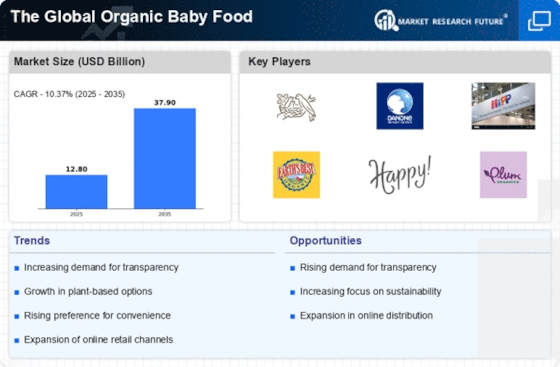Top Industry Leaders in the Organic Baby Food Market

The competitive landscape of the organic baby food market is evolving rapidly, driven by increasing consumer demand for healthier and sustainable options for their infants. Key players in this market have been strategically positioning themselves to capitalize on this growing trend, leveraging various strategies to gain a competitive edge.
Strategies employed:
Leading the charge in the organic baby food sector are well-established companies such as Earth's Best Organic, Plum Organics, and Happy Family Organics. Earth's Best, a subsidiary of The Hain Celestial Group, has long been a market pioneer, offering a diverse range of organic baby food products. Plum Organics, a part of the Campbell Soup Company, is recognized for its innovative blends and commitment to organic farming practices. Happy Family Organics, now owned by Danone, has successfully appealed to parents with its emphasis on nutrition and transparency.
These industry giants have adopted multiple strategies to maintain and expand their market share. Product innovation is a key driver, with companies constantly introducing new flavors, textures, and packaging to meet the dynamic preferences of parents. Additionally, strategic partnerships and acquisitions have become common, enabling companies to broaden their product portfolios and access new distribution channels.
factors for market share analysis:
In recent years, factors influencing market share analysis extend beyond traditional considerations. Consumers are increasingly drawn to brands that prioritize sustainability, ethical sourcing, and transparency in their supply chain. Companies are responding by emphasizing their commitment to organic farming, ethical sourcing of ingredients, and environmentally friendly packaging. This trend is not only a response to consumer preferences but also a strategic move to differentiate themselves in a crowded market.
emerging companies:
New and emerging players are making waves in the organic baby food market, challenging established brands with fresh perspectives and innovative offerings. Brands like Once Upon a Farm and Serenity Kids are gaining traction, offering unique propositions such as cold-pressed baby food and high-protein, paleo-inspired options. These newcomers often focus on niche markets, catering to specific dietary preferences or emphasizing clean, minimal ingredient lists.
industry news:
Industry news indicates a growing interest in mergers and acquisitions, reflecting the ongoing consolidation within the organic baby food market. Larger corporations are acquiring smaller, innovative brands to diversify their portfolios and tap into new consumer segments. These acquisitions often provide established brands with the resources and distribution networks needed to reach a broader audience.
Current company investment trends underscore the industry's focus on health and wellness, convenience, and sustainable practices. Investments in research and development are directed towards creating formulations that not only meet stringent organic standards but also address specific nutritional needs during a child's crucial developmental stages. Moreover, companies are investing in sustainable packaging solutions to align with environmentally conscious consumer preferences.
The overall competitive scenario in the organic baby food market is marked by a delicate balance between established players, emerging brands, and shifting consumer preferences. The market's growth trajectory is fueled by an increased awareness of the importance of early nutrition, coupled with a heightened focus on organic and sustainable choices. As consumers become more discerning, companies must continually adapt their strategies to stay ahead in this dynamic and competitive landscape.
In conclusion, the organic baby food market is witnessing a dynamic competitive landscape shaped by established players, innovative newcomers, and evolving consumer preferences. Key strategies include product innovation, strategic partnerships, and acquisitions, with a growing emphasis on sustainability and ethical sourcing. New and emerging companies are disrupting the market with unique offerings, while industry news reflects a trend towards consolidation. Company investment trends highlight a commitment to health, convenience, and sustainability. The overall competitive scenario underscores the need for companies to stay agile and responsive to changing market dynamics.
Key Companies in the organic baby food market includes
Hipp GmbH & Co.
Vertrieb KG (Germany)
Hero Group (Switzerland)
DanonS.A.A. (France)
Kraft Heinz Foods Company
Abbott Laboratories
Plum Inc
Hain Celestial Group
Bellamy's Australia (Australia)
Sprout Organic Foods Inc.
Nestle S.A. (Switzerland)


